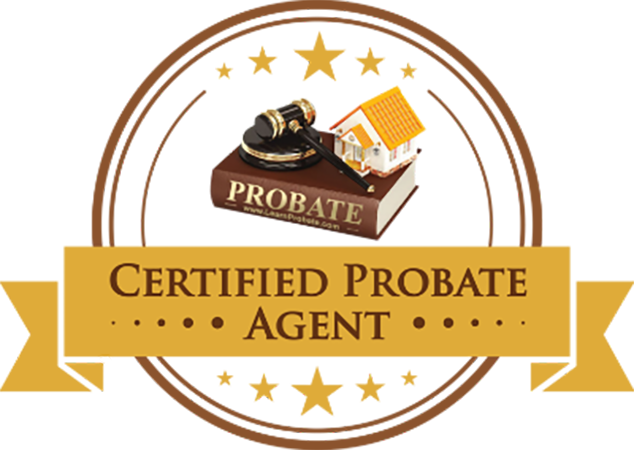Orange County Specialist in
Probate & Trust
As a probate specialist, Bibi Carrington possesses a deep understanding of the legal and procedural complexities involved in probate transactions.
Probate
Made Simple
Chances are, you're here because you've taken on the responsibility of selling a property, along with managing the intricate details of a family member or friend's estate. With over 20 years of experience as a Realtor® and home stager specializing in probate and trust properties in Orange County, CA, I'm Bibi Carrington, a seasoned real estate professional and I have sold over 380 properties. I'm an expert at guiding people in your exact circumstances dealing with houses in probate or trust.
We're not just another real estate agency; we're a boutique firm focused on delivering tailored solutions at no extra cost. With expertise in preparation, marketing, and seamless transactions, my team and I prioritize your individual needs, ensuring you receive dedicated attention and exceptional service. When you choose us, you're not just another client; you become the center of our attention. We value the trust you place in us and strive to exceed your expectations every step of the way.
As your advisor, I'll guide you through negotiations and oversee every aspect of the process for a swift and cost-effective resolution. If you're ready to move forward or have questions, reach out—I'm here to navigate this journey with you. Thank you for considering Bibi Carrington Group; I look forward to earning your trust and becoming your lifelong real estate advisor
Probate Timeline

Initiation of Probate:
Probate begins when someone files a petition with the probate court to open the estate. This typically occurs shortly after the deceased person's passing.
Appointment of Personal Representative:
The court appoints a personal representative (executor or administrator) to manage the estate. This individual is responsible for gathering assets, paying debts, and distributing remaining assets to beneficiaries.
Notification of Creditors and Beneficiaries:
The personal representative notifies creditors of the estate and publishes a notice to potential creditors in the local newspaper. Beneficiaries and heirs are also notified of the probate proceedings.
Inventory and Appraisal of Assets:
The personal representative compiles an inventory of the deceased person's assets and obtains appraisals as necessary to determine their value.

Payment of Debts and Taxes:
The personal representative uses estate funds to pay off any outstanding debts, including funeral expenses, taxes, and creditor claims. This step may involve selling assets if there are insufficient liquid funds.
Final Accounting:
Once debts and taxes are paid, the personal representative prepares a final accounting of the estate's finances, including income, expenses, and distributions.

Closure of Probate:
Once all assets have been distributed and any outstanding matters resolved, the probate court issues an order closing the estate, officially ending the probate process.
Distribution of Assets:
After approval from the court, the personal representative distributes the remaining assets to the beneficiaries according to the terms of the will or state law if there's no will.
Services You Can Expect
Probate & trust Services

Clean-Up & Donation Services
At Bibi Carrington, we understand that probate real estate often involves the challenge of dealing with accumulated personal property. Our team is fully prepared to assist you with the removal of unwanted items, cleanup, and donations. Whether you're an executor or administrator, we provide the necessary resources and services to clear the property of any debris and unwanted belongings, ensuring it's market-ready.

Repair Vendors
At Bibi Carrington, our meticulous property preparation involves collaborating with skilled professionals who excel in tasks like painting, floor installation, repairs, and more. With a deferred payment option available until close of escrow, our commitment to excellence mirrors the high standards you can expect from the LaRoche Team!

Complimentary Housekeeping
In our experience, buyers are inclined to offer higher prices for properties presented in impeccable condition. As part of our service, we offer complimentary housekeeping to ensure your property shines and leaves a lasting impression, all at no additional cost to you.

Abandoned Vehicle Removal
Probate and trust properties often come with a range of personal belongings, including vehicles. Our extensive network of professional vendors is on standby to assist you, offering flexible options for the removal of vehicles and other items, tailored to your needs.

Yard Clean Up & Maintenance
A thorough cleanup of the property, including yard debris removal, is crucial to enhancing its visual appeal. Our team understands the importance of a positive first impression, which is why we offer comprehensive yard cleanup services. Should your property require ongoing maintenance, our team of dedicated gardeners ensures its curb appeal is maintained with utmost care.

Staging
First impressions are crucial in the real estate market. As a professional home stager, I understand the transformative power of expert staging. By strategically utilizing furniture that enhances the ambiance, warmth, and flow of your home, I can significantly elevate its appeal. I meticulously curate and implement tailored furniture packages that not only resonate with potential buyers but also align seamlessly with your personal preferences and budget constraints. This approach ensures your property stands out, capturing the hearts and imaginations of potential buyers from the moment they step through the door.
Probate FAQ
Everyone has some sort of plan for what happens when they're no longer around, whether they've officially written it down or not. Even if you haven't made a will or set up a trust, there's still a plan in place based on the laws of the state you live in when you pass away. Writing a will doesn't mean you can skip over the legal process called "probate," which is how the court makes sure your property gets passed on correctly after you're gone. Probate checks your will, assigns the person you chose to handle your affairs, and keeps an eye on them to make sure they're doing things right. There are things you can do now to make life easier for your chosen person and your family later on, hopefully much later down the road.
California Probate Code section 10810 outlines the maximum statutory fees that attorneys can charge for handling a probate case. In more complex cases, courts may approve higher fees. The statutory fee structure is as follows: four percent of the first $100,000 of the estate, three percent of the next $100,000, two percent of the subsequent $800,000, one percent of the next $9,000,000, and one-half percent of the next $15,000,000. For estates exceeding $25,000,000, the court decides the fee for the amount above this threshold.
The statutory fees listed below are used in California to compensate both attorneys and executors for their work in probate cases, depending on the size of the estate. If both the attorney and the executor receive compensation, the total amount paid will be double the listed fee. The value of the estate is generally based on the estate's inventory. If an accounting of the estate is waived, the value for attorney’s fees purposes is calculated as the inventory value plus gains from sales, minus losses from sales. Debts are not considered in determining attorney’s fees. For example, if a house appraised at $1,000,000 has a mortgage of $800,000, it is still treated as a $1,000,000 asset for the purpose of calculating attorney’s fees.
Estate Value | Statutory Fee |
$100,000 | $4,000 |
$200,000 | $7,000 |
$300,000 | $9,000 |
$400,000 | $11,000 |
$500,000 | $13,000 |
$600,000 | $15,000 |
$700,000 | $17,000 |
$800,000 | $19,000 |
$900,000 | $21,000 |
$1,000,000 | $23,000 |
$1,500,000 | $28,000 |
$2,000,000 | $33,000 |
$3,000,000 | $43,000 |
$4,000,000 | $53,000 |
$5,000,000 | $63,000 |
$6,000,000 | $73,000 |
$7,000,000 | $83,000 |
$8,000,000 | $93,000 |
$9,000,000 | $103,000 |
$10,000,000 | $113,000 |
$15,000,000 | $138,000 |
$20,000,000 | $163,000 |
The fee charged to file a probate petition in Orange County is $435. There will be an additional $435 filing fee when the petition for final distribution is filed. Other fees may apply for the publication of the probate notice, for any certification of copies of court documents, and for the probate referee.
Appraisal of the Estate: Estates are appraised by probate referees, who are appointed by the State Controller to determine the fair market value of the asset. The fair market value includes mortgages and other debts, which can result in an appraisal of the property that is higher than the equity that the deceased owned in the property. Probate referees receive a fee based on .001 percent of the assets that have been appraised.
Fees Can Go Higher: In probates that are complicated by lawsuits or tax problems, the attorney and executor can ask the judge to approve fees that are higher than those set by state law.
Advantages of Probate: The proceedings are controlled by a judge, who can decide disputes between heirs or between the heirs and the executor. Creditors are required to submit their claims against the estate within a four-month period, provided they have been notified of the probate. The executor is required, in most cases, to prepare an accounting and report of the executor’s activities.
Disadvantages of Probate: The cost is usually much higher than would be required for the administration of a living trust for an estate valued at the same amount. It usually takes longer to probate an estate than to administer a trust. Most estates don’t need the supervision of the court unless disputes occur.
Probate is the court-supervised process of administering the decedent’s last will and testament. During probate, there might be property that needs to be sold; this is known as a probate sale.
Probate sales may be necessary for various reasons: to generate funds to pay off the decedent’s debts, to settle taxes, or simply to liquidate assets of the estate.
The probate process involves appointing a personal representative, such as an executor named in the will or an administrator appointed by the court. This representative is responsible for:
- Settling the claims of creditors
- Inventorying the estate
- Paying any due taxes
- Selling property, including real estate
- Managing the estate during probate
- Distributing the remaining assets to the appropriate heirs or beneficiaries
This structured process ensures that all legal and financial matters are resolved efficiently and that the decedent’s wishes are honored.
The duration of the probate process in California varies based on the size and complexity of the estate, as well as the difficulty in locating all beneficiaries. If there is a contested will or objections to the actions of the personal representative, the process can be significantly prolonged.
On average, probate in California—from the filing of the petition to open probate to the court's order for final distribution of the assets—takes nine months or more.
Why Does Probate Take So Long?
- Appointment of Personal Representative: In most California counties, it takes 6-8 weeks from the filing of the petition for an estate personal representative to be appointed.
- Notification to Creditors: Once appointed, the executor or administrator must notify all creditors, who then have four months to file a claim.
- Handling Real and Personal Property: Real property needs to be prepared, marketed, and sold, which could take another 3-4 months, including the notice of proposed action. Personal property also needs to be addressed. These steps can occur simultaneously with the notification to creditors.
- Final Distribution: After the property has been sold, a petition for distribution must be filed. It typically takes another 6-8 weeks for the court to sign the actual order of distribution.
Thus, the combination of these steps contributes to the overall length of the probate process.
The Probate Referee is an officer of the court appointed by the California State Controller. Their primary responsibility is to determine the fair market value or provide an appraisal of the real property, such as a house, within an estate. Probate referees are compensated based on the value of the assets they appraise.
To locate a probate referee, you can consult with your attorney or visit the California State Controller's Office website at https://www.sco.ca.gov/eo_probate.html.
When selling real estate held in a trust, there are some key points to keep in mind:
- Court Approval: Unlike probate sales, trust sales typically don't require court approval. However, there may be a legal obligation to notify specific interested parties.
- Similar Process: In most cases, selling real estate held in a trust follows a similar process to a standard sale. However, the trustee may be exempt from certain documentation or paperwork required in a standard transaction.
- Trustee Responsibilities: The trustee is obligated to manage the trust estate solely for the benefit of the beneficiaries. This includes keeping beneficiaries informed about the administration and taking reasonable steps to control and preserve trust property to make it productive.
It's essential for trustees to adhere to their fiduciary duties and act in the best interests of the trust and its beneficiaries throughout the sale process. Consulting with legal and financial professionals experienced in trust administration can help ensure compliance and a smooth transaction.
How Should My House Be Marketed for Sale?
To effectively market your house for sale, targeting real estate professionals and potential buyers is key. Here's how I approach marketing:
- MLS Listing: As a member of the CRMLS Multiple Listing Service in Orange County, I prioritize listing your property on the MLS with comprehensive information, including at least 25 high-quality photos, a virtual tour, and a compelling description. This ensures exposure to real estate professionals and their clients actively seeking properties.
- Online Presence: Your listing will be featured on popular real estate websites like Realtor.com, Zillow, and Trulia within 72 hours, maximizing online visibility and reaching a wider audience of potential buyers.
- Signage Innovation: To maximize the visibility of your property, we design a custom sign rider that features its own unique domain name. This domain, such as www.123yourstreet.com, is prominently displayed alongside a QR code. When scanned, the QR code directs potential buyers directly to a comprehensive online virtual tour of the property. This tour includes multiple high-quality images and detailed information about the property. Additionally, the site provides an easy option for scheduling a physical tour, facilitating seamless interaction and engagement with interested buyers. This strategic use of technology not only enhances the property's exposure but also offers potential buyers a convenient and informative viewing experience, setting your property apart in the marketplace.
- Direct Engagement: In addition to providing flyers at the property, my team follows up with prospective buyers who inquire, ensuring their questions are answered promptly and offering to schedule viewing appointments.
- Staging:First impressions are crucial in the real estate market. As a professional home stager, I understand the transformative power of expert staging. By strategically utilizing furniture that enhances the ambiance, warmth, and flow of your home, I can significantly elevate its appeal. I meticulously curate and implement tailored furniture packages that not only resonate with potential buyers but also align seamlessly with your personal preferences and budget constraints. This approach ensures your property stands out, capturing the hearts and imaginations of potential buyers from the moment they step through the door.
By combining targeted marketing efforts with personalized engagement and professional staging services, we aim to attract qualified buyers and facilitate a successful sale of your property.
What are the Responsibilities of the Personal Representative, Executor or Administrator?
The responsibility for managing the probate process falls on the personal representative, who can be either an Executor (if there is a will) or an Administrator (if there is no will). Here are the key responsibilities of the personal representative:
- Managing the Estate: The personal representative is responsible for overseeing all aspects of the estate administration, including gathering and inventorying assets, paying debts and taxes, and distributing assets to beneficiaries according to the terms of the will or state law.
- Following Probate Rules: The personal representative must adhere to the probate rules and procedures established by the court. This includes filing necessary documents, providing notice to creditors and beneficiaries, and obtaining court approval for certain actions, such as selling real estate owned by the estate.
- Nomination and Appointment: If there is a will, the Executor is typically nominated in the will itself. If no Executor is named or willing to serve, state law determines the order of priority for appointing an Administrator, usually starting with the closest relatives of the deceased.
- Court Oversight: The probate court exercises significant control over the actions of the personal representative, requiring prior court approval for certain decisions and transactions to ensure they are in the best interests of the estate and its beneficiaries.
Overall, the personal representative plays a critical role in managing the probate process and ensuring the timely and proper administration of the estate under the supervision of the probate court.
From your real estate agent, you should expect professionalism, effective communication, and personalized support throughout the home buying or selling process. Here's what you can anticipate from my team and me:
- Systematic Transaction Handling: We have a well-established system in place to manage all the details of your transaction efficiently. This ensures that every aspect of your real estate transaction is handled promptly and accurately.
- Transparent Communication: One of our top priorities is keeping you informed every step of the way. We understand that communication is key, so you can expect to receive regular updates on the progress of your transaction. Whether it's through weekly updates or immediate communication for important matters, we strive to keep you in the loop at all times.
- Accessibility: Your questions, concerns, and feedback are important to us. You can reach out to me directly via phone at (949-449-0663) or email at bibi@sellingprobateandtrust.com. I am always available to address any inquiries you may have and provide the support you need throughout the transaction process.
- Personalized Service: Every client is unique, and we tailor our services to meet your specific needs and preferences. Whether you're buying or selling a home, we are committed to ensuring your comfort and satisfaction throughout the entire transaction.
Overall, you can expect a high level of professionalism, clear communication, accessibility, and personalized support from me and my team as we guide you through your real estate journey.
A Certified Probate Real Estate Specialist (C.P.R.E.S.) is a real estate professional who has undergone specialized training to handle probate transactions with expertise and efficiency. With the increasing number of probate filings in local courts, there is a growing demand for professionals who understand the complexities of the probate process and can navigate it effectively.
Executors and Administrators tasked with managing probate estates require knowledgeable resources to facilitate the marketing and sale of real and personal property. It is essential to ensure that probate transactions are conducted with integrity and efficiency, adhering to defined probate timelines.
As a Certified Probate Real Estate Specialist, I have received rigorous training and certification, including mastering negotiation skills as a Master Certified Negotiation Expert. My expertise in probate transactions benefits the estate by ensuring a smooth process and optimal outcomes.
With my specialized knowledge, I can guide Executors and Administrators through the complexities of the probate process, helping them make informed decisions and achieve a win-win situation for all parties involved. Whether you are navigating the probate process as an Executor, Administrator, or beneficiary, having a Probate-Certified Realtor like myself on your side can provide invaluable support and expertise.
As the personal representative of a probate or trust, you have the authority to make decisions that are in the best interest of the estate, including whether to sell the property as-is or make repairs. While some personal representatives opt to sell the property in its current condition, many choose to complete cost-effective repairs recommended by professionals.
The crucial factor when considering repairs is their cost-effectiveness. It's essential to assess whether the repairs will enhance buyer interest and ultimately increase the net proceeds to the estate. By investing in repairs that improve the property's appeal and value without exceeding the expected return, you can potentially attract more buyers and achieve a higher selling price.
Ultimately, the decision to sell as-is or make repairs should be based on careful evaluation of the property's condition, market factors, and the estate's goals. Consulting with real estate professionals and trusted advisors can help you make informed decisions that maximize the estate's assets while fulfilling your fiduciary duties as the personal representative.
Title and escrow companies play vital roles in facilitating real estate transactions, particularly in Orange County. Here's what they do:
Title Company:
- Title Research: Conducts a thorough examination of the property's title to ensure there are no liens, lawsuits, or mortgages that could affect ownership.
- Title Insurance: Provides title insurance to protect the buyer and lender against any unforeseen issues with the title.
- Resolution of Discrepancies: Works to resolve any discrepancies found in the title search to ensure a clear title for the buyer.
- Coordination with Lender: Coordinates with the lender to satisfy any requirements for the issuance of a loan, including providing necessary documentation.
Escrow Company:
- Administration of Purchase Agreement: Administers the terms of the purchase agreement, holding funds and documents securely until the transaction is complete.
- Collection of Funds: Collects and holds funds from the buyer, seller, and lender in an escrow account until all conditions of the sale are met.
- Protection of Interests: Protects the interests of all parties involved in the transaction, including buyers, sellers, and lenders.
- Closing Process: Facilitates the closing process by preparing the final settlement statement, known as the HUD-1 statement, detailing all costs associated with the sale.
- Disbursement of Funds: Disburses funds to the appropriate parties once the transaction is finalized and all conditions are met.
In summary, title and escrow companies work together to ensure that real estate transactions proceed smoothly and securely, protecting the interests of buyers, sellers, and lenders throughout the process.
Handling the personal property of a decedent as an executor or administrator involves careful consideration and responsible decision-making. Here are the 3 main options outlined for dealing with such property in Orange County:
- Donation: This is a benevolent choice that can also provide tax benefits. By donating the decedent’s personal property to charitable organizations or non-profit groups, you can support a good cause and possibly enhance the tax position of the estate.
- Estate Sale: Organizing an estate sale is particularly useful when there are numerous valuable items left by the decedent. This option allows you to potentially realize greater value from the property. However, it requires more time for planning and execution, which could delay other aspects of settling the estate, like selling real estate.
- Buy Out: As in the case of Sean who dealt with property in Laguna Woods, a buyout can be an efficient solution especially when all beneficiaries are located far from the property. Hiring a local buyout company to purchase and clear out the personal property simplifies logistics and accelerates the closure of the estate.
Each option has its advantages and considerations. The choice depends on the specific circumstances of the estate, the location and condition of the property, and the needs and preferences of the heirs. It’s important to consult with legal and financial advisors to ensure that any action taken aligns with legal requirements and is in the best interest of the estate and its beneficiaries. This professional advice is crucial in helping you fulfill your fiduciary duties effectively and in compliance with applicable laws and regulations.
Setting the right list price for a property is crucial for attracting buyers and ensuring a timely sale. To choose the best list price for an estate property in Orange County, follow these steps:
- Analyze Comparable Sales (Comps): Look at recent sales of similar properties within a 1-mile radius of your property. Pay close attention to key details such as sale price, price per square foot, and the condition of these properties. This gives you a solid foundation to understand what buyers might be willing to pay for a similar property in the same area.
- Examine Current Listings: Consider the properties currently listed for sale as they represent your direct competition. Note their listing prices, property condition, size, and any unique features that might influence their market appeal. This helps in positioning your property competitively.
- Adjust for Market Conditions: If the market is hot and properties are selling quickly, you might price your property at the higher end of your comps. Conversely, in a slower market, a more conservative pricing strategy might be necessary to attract buyer interest.
- Consider Unique Property Features and Condition: Adjust your price based on how your property compares to others in terms of size, condition, upgrades, and any unique features that might add to its value.
- Factor in Days on Market: Properties that sell quickly often do so because they are priced right from the start. Analyze how long comps were on the market before selling. If similar properties sold quickly, pricing yours competitively could lead to a faster sale.
- Consult with Real Estate Professionals: Leverage the expertise of local real estate agents who understand the nuances of the Orange County market. They can provide valuable insights into pricing strategies that work best in the current market environment.
- Review and Adjust: The real estate market is dynamic, so be prepared to adjust your pricing strategy based on feedback and market conditions after your property is listed.
By meticulously analyzing market data and considering these strategic factors, you can set a list price that is not only competitive but also likely to facilitate a timely and successful sale of the property.
Yes, the paperwork in an Orange County probate or trust sale is indeed different from that in a traditional real estate transaction. Here's how:
- Seller Disclosures: In typical real estate transactions, the seller is required to provide comprehensive disclosures about the property's condition, including any known defects like water intrusion, roof leaks, and appliance issues. These disclosures help inform the buyer about the property's condition and any potential issues they might inherit.
- Probate and Trust Sales Disclosures: In probate, trust, or conservatorship sales, the situation often differs because the seller (typically the executor or trustee) may not have personally lived in the property. This limits their knowledge of the property's history and condition. As a result, disclosure requirements are adjusted to reflect this lack of firsthand knowledge.
- Special Forms: The California Association of Realtors provides specific forms designed for use in probate and trust transactions in Orange County. These include special disclosure forms, listing agreements, and purchase contracts tailored to address the unique aspects of these sales, ensuring all legal requirements are met and that the sale process is clear and compliant.
Overall, these differences in paperwork are crucial to ensure that all parties are adequately protected and informed during the transaction, particularly in the unique circumstances surrounding probate and trust sales.
Understanding real estate appraisals is key when purchasing property, especially if you're securing financing. Here’s what you should know about the process:
- Purpose of Appraisal: A real estate appraisal is required by lenders to obtain an independent and professional valuation of the property. This ensures that the amount of money loaned is appropriate relative to the property's value. The appraisal supports the buyer's down payment plus the loan amount, ensuring it matches the agreed upon purchase price.
- Appraisal Process: During an appraisal, a licensed appraiser visits the property to assess its condition and note its features. The appraiser will measure the property, take detailed notes on its condition, amenities, and take photographs of each room and the exterior. They also evaluate the property's surroundings and location.
- Comparative Market Analysis: The appraiser compares the property against similar recently sold properties in the area (usually within a half-mile to one-mile radius). They also consider one or two pending sales to gauge the property’s market value accurately.
- Appraisal Report: All collected data is compiled into a concise report, which is then sent to the lender. This report includes detailed descriptions and photos of the property and comparative analysis with similar properties.
- Loan Underwriter Review: The loan underwriter at the lending institution reviews the appraisal report to make a final decision on loan approval. This step is crucial as it confirms whether the property is worth the investment from the lender's perspective.
- Cost of Appraisal: Typically, the buyer is responsible for the cost of the appraisal. This fee ranges between $450 and $600 and is usually paid in advance. The appraisal fee is part of the closing costs and is a necessary expenditure to secure the mortgage.
Overall, the appraisal is a critical component of the home buying process, providing a safety check for the lender and assurance to the buyer that the purchase price is fair based on current market conditions.
In the context of probate law, a Notice of Proposed Action is a document that a personal representative (executor or administrator) of an estate must send to interested parties before taking certain significant actions during the administration of an estate. This notice is part of the procedures intended to keep beneficiaries and other interested parties informed about the estate’s management and to offer them a chance to object to proposed actions before they are executed.
Here are the key aspects of a Notice of Proposed Action in the probate process:
- Purpose: The Notice of Proposed Action informs beneficiaries and interested parties of significant actions the executor or administrator intends to take in managing the estate. This could include selling real estate, leasing property, or making substantial changes to investment holdings, among other significant decisions.
- Content: The notice typically includes details about the action to be taken, such as the terms of a real estate sale (e.g., sale price and buyer details). It provides enough information for the recipients to understand what is being proposed and the potential impact on the estate.
- Waiting Period: Once the notice is sent, there is a mandatory waiting period (usually 15 days in California) during which recipients can object to the proposed action. If no objections are received by the end of this period, the personal representative may proceed with the action without further court approval.
- Objections: If an objection is received, the personal representative must either resolve the objection with the interested parties or petition the court for approval to proceed with the action. This may involve a hearing where the court will decide whether the proposed action is in the best interest of the estate.
- Benefits: Using a Notice of Proposed Action can streamline the estate administration process by avoiding the need for a court hearing for every significant decision. It allows the personal representative to handle estate matters more efficiently while still providing oversight and input from the beneficiaries.
By using the Notice of Proposed Action, the probate process ensures transparency and offers a safeguard for the interests of the estate and its beneficiaries, promoting fair administration and preventing potential abuses.
In probate law, "Letters of Administration" are a legal document issued by a court that grants authority to an individual, known as the administrator, to administer the estate of someone who has died intestate (without a will). This document is essential because it provides the legal power needed to manage and distribute the deceased's assets in accordance with state laws.
Here’s a breakdown of the key aspects of Letters of Administration:
- Purpose: Letters of Administration are used to appoint an administrator to handle the estate of a deceased person who did not leave a will. They serve as proof that the individual possesses the legal authority to act on behalf of the estate.
- Issuance: These letters are issued by a probate court after an application process that typically includes verifying the death, identifying the heirs, and ensuring that there are no disputes over who should manage the estate. If someone dies without a will and has assets that need to be settled, the court must approve an administrator to manage these tasks.
- Responsibilities of the Administrator: The administrator's responsibilities are similar to those of an executor (who administers a will). They include collecting and inventorying the deceased’s assets, paying debts and taxes, and distributing the remaining assets to the rightful heirs according to the laws of intestacy.
- Legal Authority: With Letters of Administration, the administrator gains the authority to access bank accounts, sell property, pay debts, and perform other tasks necessary to settle the deceased’s estate. This document is often required by financial institutions and other entities before they will release the deceased's assets to the administrator.
- Limitations: The authority provided by Letters of Administration is limited to estate-related activities. It does not allow the administrator to act beyond what is legally required to manage and close the estate.
- Ending the Administration: Once all debts, taxes, and distributions are properly handled, the administrator is required to provide a final accounting to the court. Once approved, the court will close the estate, and the administrator's role will end.
Letters of Administration are a crucial aspect of handling estates without a will, ensuring that there is a legal authority to manage and distribute the deceased person's assets responsibly and in accordance with the law.
Deciding whether to credit money to Orange County homebuyers instead of completing requested repairs is an approach worth considering for several reasons:
- Quality Assurance: By offering a credit instead of making the repairs yourself, you avoid any potential disputes over the quality of the repairs. Buyers may have specific expectations or preferences for how repairs should be handled, and a credit allows them to manage the process to their satisfaction.
- Simplicity and Convenience: Crediting the buyer removes the need for coordinating schedules between contractors, sellers, and buyers. This can be especially beneficial if either party has time constraints or if the property is in a location that makes scheduling difficult.
- Legal and Financial Clarity: By drafting a formal agreement detailing the credit amount that will be applied toward the buyer's closing costs, both parties have a clear, legally binding understanding of the financial adjustments. This transparency helps prevent misunderstandings and simplifies the transaction for both parties.
- Escrow Process: Once the agreement is signed by both the seller and the buyer, it's handed over to the Escrow company. The escrow agent will ensure that the funds are correctly credited from the seller’s proceeds to the buyer’s costs, ensuring a smooth and secure transfer.
This approach not only streamlines the closing process but also empowers buyers to manage repairs according to their standards and preferences, potentially making the property more appealing and the transaction more agreeable to prospective buyers.
In Orange County, California, as in other jurisdictions, the terms "executor" and "administrator" refer to roles that are similar in function but differ based on the circumstances of the estate they manage:
- Executor: An executor is a person named in a deceased individual’s will who is designated to execute the will’s instructions and manage the estate's affairs according to the wishes of the decedent. The executor's role is to ensure that assets are distributed as specified in the will, debts and taxes are paid, and any other directives in the will are carried out. This role is activated only when there is a valid will in place that names an executor.
- Administrator: An administrator, on the other hand, is appointed by the Orange County Probate Court when a person dies intestate (without a will), or if the will does not name an executor, or the named executor is unable or unwilling to serve. The administrator has similar responsibilities to an executor, such as managing the estate’s assets, paying debts and taxes, and distributing the assets. However, since there is no will to guide the distribution, the administrator must follow the state’s intestacy laws to distribute the assets to the decedent’s legal heirs.
Both roles involve similar duties regarding estate management, but the key difference lies in the presence of a will and the directives it contains. Executors carry out the specific wishes of the decedent as expressed in the will, while administrators adhere to state laws in managing and distributing the estate of someone who did not leave a will.
Bibi's specialties and accreditations
Certified Specialists in





Getting through probate can be stressful.
Empower yourself by learning more about process and how to successfully navigate unfamiliar territory.
Free Probate guide
Personal Property Dos Don'ts & Options

The Complete Playbook
BUYING A HOME
Buying a HomeThe Complete Playbook


how to buy like a pro
Free Buyer's Guide
Comprehensive Real EstateBuyer's Guide


how to buy like a pro
Free Buyer's Guide
Comprehensive Real EstateBuyer's Guide
Free seller's guide
Sell your home faster
You’ll receive top down picture of nearly everything you need to consider as a real estate seller in any market. Get more informed by requesting our guide below!


How to upsize into a bigger home
Free Seller's Guide
Comprehensive Real EstateSeller's Guide


How to upsize into a bigger home
Free Seller's Guide
Comprehensive Real EstateSeller's Guide


How to upsize into a bigger home
Free Seller's Guide
Comprehensive Real EstateSeller's Guide
Ready to take
The next step?
Bibi Carrington offers comprehensive assistance to clients navigating probate, providing invaluable support at every step of the process
